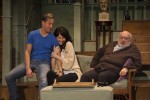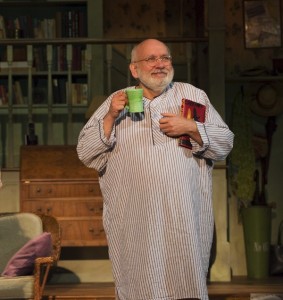In a Blue Moon tours the Lower Mainland, and beyond. (photo by Barbara Zimonick)
From the première of Strange Bedfellows on Broadway in 1948 to today’s Skylight, audiences have enjoyed the plots of mismatched individuals thrown together who somehow weave a life for themselves.
Similarly, In a Blue Moon, the latest work of playwright Lucia Frangione and dramaturg Rachel Ditor, brings together the unlikely duo of Ava, a widow, and Will, the brother of Ava’s late husband, Peter. The play takes place in British Columbia, where Ava and 6-year-old daughter Frankie move to a cottage near Kamloops that Ava inherited. On arrival, they find Will living there between jaunts around the world to practise his photography.
Though Frankie takes a shine to her uncle, Ava’s and Will’s differences keep the two adults apart. Will is the charming, adventurous, carefree spirit enjoying life’s carnal pleasures, while Ava is a yoga-practising vegetarian with a “tsk-tsk” attitude, whose goal is to live healthily and set up an Ayurveda clinic. Her move to Kamloops is based loosely on the life of Frangione’s own uncle, who was a farmer who decided to become a massage therapist late in life.
Life in the rural cottage focuses on discussions between Ava and Will – their different views of life, their memories of Ava’s husband – and the presence of Frankie, whose emotions alternate between happy-go-lucky precociousness, enjoying time with her uncle, and confused anger around the death of her father.
Over time, the three become close, like their own small family, and it seems that Ava and Will might have a future together, but when Will’s former girlfriend enters the picture, that future looks like it will change irreversibly.
This play delves into some interesting dynamics between the lead characters, who seem to have an unbridgeable gulf between them, made worse by the different ways in which they reacted to the death of Peter, who had suffered from diabetes. Will didn’t know the extent to which Peter had ignored doctors’ warnings, even going so far as to stop taking medications and drinking and eating what he wasn’t supposed to. Ava admits she had lost respect for her husband because he had given up on staying healthy. As the severity of the disease worsened, Ava had to watch painfully as her husband slipped away.
Despite the gravity of the subject matter, there are many light-hearted moments in the writing, such as when Frangione pokes fun at some stereotypical holistic healing references (Ava tells her daughter that she has “undigested emotion”) or when Will tries a few yoga poses – and fails miserably.
Unfortunately, what could have been a solid, thought-provoking play is weakened by some less-than-stellar directing. Will delivers a performance of gruff indifference, where practically every line sounds like it should be punctuated with a grunt. Even when he’s reflecting on an old rolling pin that he’s kept over the years, his voice is more angry than nostalgic and he almost barks how the red handles please his sense of esthetic.
Ava’s delivery is quite flat, as well, with practically no raw emotion showing up until the second act, when her jealousy of Will’s ex causes her to drown her sorrows in alcohol.
The biggest redeeming aspect of the play is the set design, in which photographs are projected on a large circular backdrop that starts as a giant moon, but later looks like a massive window overlooking the cottage surroundings. Images of the actors enjoying the countryside together are also projected on this backdrop in short sequential bursts, making it seem as though these actors are real people outside of the play. It’s quite a unique and clever way to add another dimension to the activities on stage and was enjoyable to watch throughout the performance.
In a Blue Moon is an Arts Club on-tour show. It runs at Surrey Arts Centre until Jan. 23 (604-501-5566), Clarke Theatre in Mission Jan. 25 (1-877-299-1644) and at Evergreen Cultural Centre in Coquitlam Jan. 26-30 (604-927-6555). Contact artsclub.com or 604-687-5315 for more information.
Baila Lazarus is a freelance writer and media trainer in Vancouver. Her consulting work can be seen at phase2coaching.com.



